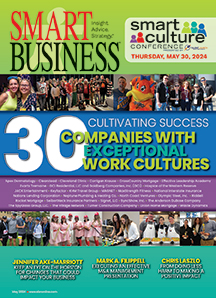Engage through goals
Yager is not a big believer in burning the midnight oil to get the job done. Rather than praise an employee for doing so, he would more likely wonder why the employee wasn’t able to complete the task during regular work hours.
One of the ways you can help employees prioritize their workload is to give them a means to set and pursue goals. It provides a venue to discuss what they are doing and gives them a chance to feel like they’re making progress in their work.
“What we’re trying to inspire out of them is the thought process and how they view themselves and how they view their role in the company,” Yager says.
One of the keys to making the goal-setting process work is to make sure the goals are able to be objectively measured.
“We’re trying to get more eco-friendly with paperwork reduction,” Yager says. “So one of the goals for somebody is we want to have it where all the documents are electronic. We need to get an electronic scanning system so we can scan everything and reduce the amount of paperwork. So that was one of their major goals.
“It has to be something that you can objectively measure whether they did it or didn’t do it. You don’t want it to be subjective, because then it’s going to be a gray area and they’re going to argue that they did it and you may argue that they didn’t do it. Make sure that they keep it objective.”
Employees should have someone to meet with and review the goals they’ve come up with. It’s not that you’re trying to censor their goals. You’re just trying to make sure they are helping both the employee and the company.
“The supervisor will review it, and depending on the employee, I’ll review some of them,” Yager says. “There might be a little back and forth where I get back to them and say, ‘Listen, this one is good. This one isn’t good. We need to look at something a little different.’ It may take a month before you come to a consensus.”
Make sure both the supervisor and the employee get a copy of the goals. Monitor the goals throughout the year to check on the employee’s progress toward achieving them.
“At the end of the year, we’ll whip it out and say, ‘Hey, you did it or you didn’t do it,’” Yager says. “The key is you have to be objective. It can’t be, ‘I want to increase sales.’ It could be, if I was one of the salesmen, ‘I want to get X customer to start contracting one of the items that he is not currently buying.’ It has to be something that anybody can measure objectively.
“You really find how people view themselves in the company and how lost some people are and how focused other people are. By doing that, you’re helping them to get focused on what you want them to do. But it’s coming from them, so they’re clear on what they want to do.”
Yager believes there is also benefit in giving employees personal goals to pursue through their work.
“A friend of mine in the industry, he told me about a book that he wrote,” Yager says. “The gist of it was that it was a cleaning company with a tremendous turnover problem. You can imagine a cleaning company. People don’t want to be in the cleaning business for the rest of their lives. So they hired this business guru to figure out how to prevent people from leaving. To make a long story short, they went in and they interviewed the employees and they set this program: ‘What were the employees goals and dreams? What did they want to do in life?’
“Obviously, you have to be realistic. My dream in life is to have a G5 and a 100-foot yacht, but I have to be realistic. You try to get them to have a realistic goal. How can we as a company help you achieve it? It’s a personal goal. It’s not a company goal. I want to get a new car in a year. I want to be able to buy a house. Whatever it is they want to do, you set out a plan. This is how we’re going to help you achieve your goal. As a consequence of that, their turnover rate went to zero because everybody felt better about where they stood and where they were headed in life.”
One of the results of this goal-setting process at Alpine Fresh has been a clearer identity of purpose for employees.
“People are working toward their goals,” Yager says. “They are not working toward them every day, but you have a year.”
The benefit of giving employees goals to pursue has been most clearly evident at the middle level of the company.
“At the top level, people are at the top level for a reason,” Yager says. “At the midlevel, they have a better understanding of what their role is in the company. Those are the people that can make a difference. A great quarterback needs linemen to protect him. Those are the people doing that for you.”
How to reach: Alpine Fresh Inc., (800) 292-8777 or www.alpinefresh.com

